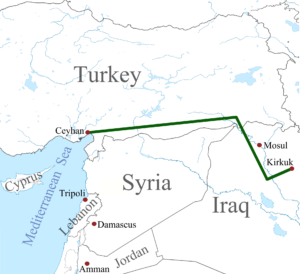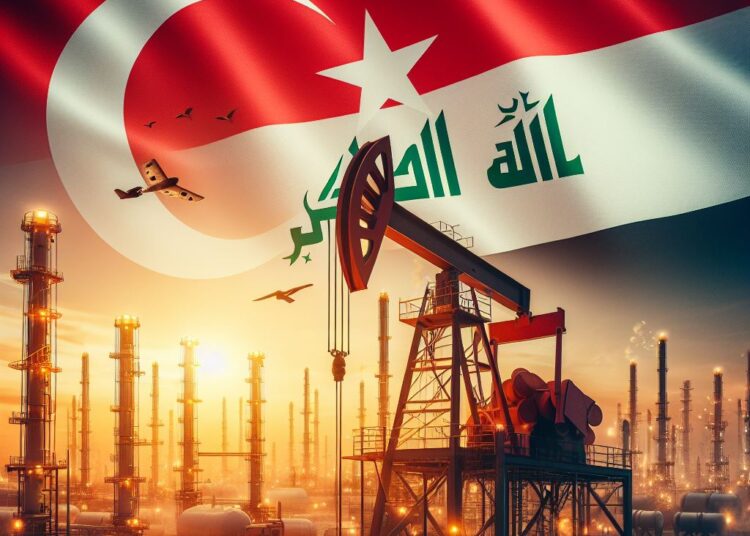Levent Kenez/Stockholm
Turkey faces mounting economic and geopolitical costs as the Kirkuk-Ceyhan oil pipeline, a key energy corridor linking northern Iraq’s oil fields to the Mediterranean, has been closed for more than two years. Parliamentary proceedings and recent investigations suggest the prolonged shutdown is not solely due to diplomatic impasses or legal disputes but is also connected to alleged corruption benefiting the inner circle of President Recep Tayyip Erdogan.
Operations of the 1,000-kilometer-long pipeline, jointly managed by Turkey’s state-owned pipeline company BOTAŞ and Iraq’s State Oil Marketing Organization (SOMO), were suspended in March 2023 after the International Chamber of Commerce ruled against Turkey for violating a 1973 bilateral agreement. The arbitration panel found that Ankara had unlawfully allowed the Kurdish Regional Government to export crude oil independently through the Ceyhan terminal, bypassing Baghdad. The tribunal awarded Iraq about $1.5 billion in damages, which Turkey was forced to pay.

While Turkish officials, including Energy Minister Alparslan Bayraktar, have repeatedly said the pipeline is technically ready to resume operations, no progress has been made on the ground. President Erdogan’s widely publicized visit to Baghdad in 2024 failed to produce a breakthrough. Despite media attention, no agreement was signed regarding the pipeline’s reopening. Analysts viewed the visit as an attempt to repair strained energy ties but concluded that it pointed to Turkey’s diminished leverage in the region.
According to the Turkish Parliament’s State Economic Enterprises Committee, the ongoing suspension is causing serious financial damage. BOTAŞ continues to incur monthly costs estimated at $25 million for guaranteed throughput and maintenance on a pipeline that has carried no oil since early 2023. Lawmakers criticized Erdogan’s administration for mishandling the arbitration process and failing to pursue proactive diplomacy to avoid or mitigate the ruling.
However, the pipeline’s closure involves more than legal missteps or bureaucratic inertia. A 2024 investigation by Nordic Monitor revealed that the original arrangement allowing Kurdish oil exports through Ceyhan enriched individuals and companies connected to Erdogan’s family. The exposé included documents showing how payments for Kurdish crude were funneled through offshore intermediaries, including energy companies with opaque ownership structures linked to the president’s extended network.
Although the International Chamber of Commerce (ICC) later ordered Turkey to compensate Iraq for these unauthorized exports, Nordic Monitor reported that the scheme had generated substantial private profits for Erdogan’s associates over the course of several years. Sources quoted in the investigation said the financial gains made it politically difficult for the administration to fully resolve the dispute even after the court ruling. This raises the possibility that Turkey’s reluctance to press harder for the pipeline’s reopening is tied not only to diplomatic tensions but also to protecting personal financial interests.
Minutes of the parliamentary committee meeting on June 24, 2025
These allegations have fueled skepticism among Turkish lawmakers. During the most recent State Economic Enterprises Committee meeting on June 24, 2025, opposition members of parliament questioned BOTAŞ and Energy Ministry officials about why the pipeline remains closed despite claims that technical repairs were complete. “There is no reason why this pipeline should not be operating,” one lawmaker said. “We are losing money every single day, and yet there is no transparency, no resolution and no accountability. Who is really benefiting from this delay?”
Republican People’s Party (CHP) lawmaker Deniz Yavuzyılmaz told the parliamentary committee that the suspension of crude oil flow has cost Turkey at least $400 million — about 15 billion Turkish lira — in transit fees. Yavuzyılmaz also questioned whether the government is deliberately keeping the pipeline closed to offset the $1.5 billion arbitration penalty imposed by the ICC. “Is the plan to keep the pipeline shut for years so that losses from unpaid transit fees balance out the damages we owe?” he asked. He further called for a full accounting of profits Turkey allegedly earned by facilitating oil exports from the Kurdish Regional Government without Baghdad’s consent. “Who benefited from this? Did the Turkish state gain, or were private companies involved? How much did they earn? This entire process remains a black hole — opaque and unaccounted for,” Yavuzyılmaz said.
Complicating the situation is the unresolved dispute between Iraq’s federal government in Baghdad and the Kurdish Regional Government in Erbil. Baghdad insists all crude exports must be routed through SOMO, effectively ending the Kurdish government’s decade-long independent export strategy. The legal ruling in The Hague strengthened Baghdad’s position and increased pressure on Turkey to halt Kurdish exports, pressure Turkey eventually accepted, though reluctantly.
Meanwhile, Iraq is pursuing alternative export routes to reduce reliance on Turkish territory. In recent months Baghdad has revived discussions about the Kirkuk-Baniyas pipeline, an old transit corridor that would send crude to Syria’s Mediterranean coast. Originally built in the 1950s but rendered inoperable by war and neglect, the Baniyas route would provide a direct link to global markets, bypassing Ceyhan entirely. Iraqi officials have held talks with their Syrian counterparts, and preliminary engineering surveys are reportedly underway. If completed, the new pipeline could deliver more than 300,000 barrels per day, significantly reducing Turkey’s role in regional energy logistics.
Iraq’s petition to enforce the ICC award against Turkey in the US District Court:
Despite the high economic and strategic stakes, Turkish authorities have offered few public details about negotiations with Iraq. During his 2024 visit to Baghdad, Erdogan spoke optimistically about “deepening bilateral cooperation,” but energy experts note no formal energy framework was agreed upon. Observers say neither side has shown willingness to compromise: Baghdad insists on full control over oil exports, while Ankara, aligned with the Kurdish Regional Government, appears hesitant to publicly sever those ties.












